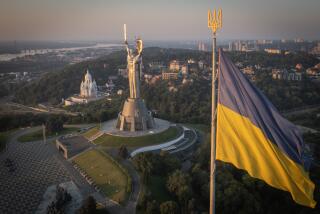Moscow Sends Envoy to Ease Tense Mideast
- Share via
MOSCOW — Alarmed by military activity in the Persian Gulf, the Soviet Union has dispatched a high-level envoy in an attempt to ease the situation, a Foreign Ministry spokesman announced Wednesday.
Mikhail Sytenko, a former U.N. undersecretary general, left Moscow on Tuesday “to stop the escalation of tensions in the region and stop tensions caused by the Iraqi aggression against Kuwait,” Foreign Ministry spokesman Yuri A. Gremitskikh told reporters.
Sytenko, a specialist in Middle East affairs, is scheduled to consult with the leaders of Syria, Jordan and Egypt, then travel to Baghdad, capital of Iraq, where 5,000 Soviet nationals have been refused permission to leave, the spokesman said. In all, he said, there are about 7,800 Soviet nationals in Iraq and about 800 in Kuwait.
Iraqi authorities have given women and children permission to leave by overland routes but have denied such permission to Soviet men.
“I would not want to use the word hostages ,” Gremitskikh said. “We hope Iraq does not consider our citizens hostages, and we do not want to see them as hostages.”
Soviet leaders have condemned Iraq’s invasion of Kuwait but have also voiced disapproval of a Mideast military force organized against Iraq outside the framework of the United Nations.
Although the Soviet Union and Iraq are keeping “intense contact through their embassies,” Soviet diplomats have not been able to negotiate a change in Iraq’s position: that Soviet women and children may not leave by plane or ship but must make the grueling trip by car, in sweltering heat, Gremitskikh said.
Also, he said, they are forbidden to leave the country in vehicles with Iraqi license plates, meaning that buses must be chartered in Amman, the capital of Jordan.
Despite the restrictions, the first contingent of Soviet nationals, about 230 people, was believed to be leaving Wednesday.
Gennady I. Yanayev, the Politburo’s foreign relations chief, told reporters his government is concerned about the escalation of forces in the Persian Gulf region.
“We do not support unilateral actions aimed at a naval blockade, which some countries are now trying to impose,” he said. “It seems to us that the economic sanctions, which were enforced by the U.N. Security Council, should be given a chance to work.
Foreign Minister Eduard A. Shevardnadze told the official news agency Tass, after consulting with Indian External Affairs Minister Inder Gujral, that the massive involvement of foreign forces in the gulf region could be dangerous for world peace.
“It is in the interest of the Soviet Union and the entire world to prevent the conflict from spreading, and to restore peace and tranquillity in the region as soon as possible,” Shevardnadze said.
More to Read
Sign up for Essential California
The most important California stories and recommendations in your inbox every morning.
You may occasionally receive promotional content from the Los Angeles Times.













